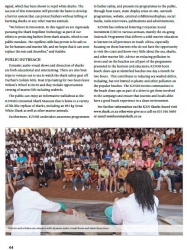
Pioneers In The Maritime Industry : The KwaZulu-Natal Sharks Board Maritime Centre of Excellence (KZNSB) - Pivot RSS Pioneers In The Maritime Industry : The KwaZulu-Natal Sharks Board Maritime Centre of Excellence (KZNSB) - Pivot2017-06-09 The KwaZulu-Natal Sharks Board Maritime Centre of Excellence (KZNSB) (MCoE) established in 1964, strives to be a leader in environmentally sensitive protection of bathers against sharks and capacity building in the maritime sector. Currently 37 beaches on the KwaZulu-Natal (KZN) coastline are safeguarded with shark safety gear owned and maintained by the KZNSB. The organisation positions itself as “The Only Organisation of Its Kind in the World.†“KZNSB is one of the key role-players in coastal and marine tourism in KZN and a major participant of the Oceans Economy, Operation Phakisa. In recent years the role of the organisation has evolved to respond to changes in the province’s economy with the institution’s operations becoming complementary with the functions of other entities, especially tourism,†said Mthokozisi Radebe, CEO of the KZN Sharks Board.
KwaZulu-Natal is well known for its ambient climate, beautiful beaches and warm waters. Many of the international visitors to the province are aware of the protection of bathers against the potential risk of shark attacks. These visitors stay in hotels, eat at restaurants, shop at malls and also take the opportunity to visit other tourist attractions including mountains and game reserves. This spend contributes significantly to the GDP of the province. Radebe commented “Our protected beaches create a sound basis for exploring other strategic tourism based economic opportunities including the further development of coastal resorts.†RESEARCH DEVELOPMENT AND PLANNING DIVISION The KZNSB has a research development and planning division that is responsible for conducting research into the biology of sharks and other marine animals. KZNSB scientists are actively involved in many spheres of shark and dolphin research, including maintaining the South African section of the International Shark Attack File and funding alternative methods of protecting bathers. Indepth research, that has already produced vital insight, is conducted into shark behaviour, feeding and breeding. The KZNSB Act requires that measures to reduce the risk of shark attack and to attempt to reduce the environmental cost associated with those measures are implemented. As a result, the KZNSB continuously looks at ways to reduce the catch of sharks and other non-shark species. “Initially humans were thought to need protection from sharks but nowadays sharks, as they are in their natural habitat, need protection from humans.†said Radebe As part of the organisation’s drive towards reducing environmental impact, the following measures have been implemented: net reduction, introduction of drumlines, beach clean-up campaigns, introduction of pingers to deter dolphins and whales and the shark repellent technology (SRT). The KZNSB received a permit from the Department of Environmental Affairs to test the Shark Repellent Technology (SRT), well known as the shark repellent cable. This technology is the brainchild of the KZNSB. The cable, 100 metres long emits a low frequency pulsed electronic signal, which has been shown to repel white sharks. The success of this innovation will provide the basis to develop a barrier system that can protect bathers without killing or harming sharks or any other marine animals. “We believe in innovation. In this regard we are vigorously pursuing the Shark Repellent Technology as part of our efforts to protecting bathers from shark attacks, which is our public mandate. The repellent cable has proven to be safe so far for humans and marine life, and we hopes that it can soon replace the nets and drumlins,†said Radebe. PUBLIC OUTREACH Dynamic audio-visual shows and dissection of sharks are both educational and entertaining. There are also boat trips to venture out to sea to watch the shark safety gear off Durban’s Golden Mile. Boat trips lasting for two hours leave Wilson’s Wharf at 06:30 and they include opportunistic viewing of marine life including seabirds. The public can enjoy an informative walkabout at the KZNSB’s renowned Shark Museum that is home to a variety of life-like replicas of sharks, including an 892 kg Great White Shark as well as other marine animals. Furthermore, KZNSB undertakes awareness programmes in bather safety, and presents its programmes to the public, through boat tours, static display areas on site, outreach programmes, website, external exhibitions/displays, social media, radio interviews, publications and advertisements. KZNSB has embraced fostering Corporate Social Investment (CSI) in various avenues, mainly the on-going Outreach Programme that delivers a solid marine education to learners in all provinces in South Africa, especially focusing on those learners who do not have the opportunity to visit the coast and know very little about the sea, sharks, and other marine life. Advice on reducing pollution in rivers and on the beaches are all part of the programme presented to the learners and educators; KZNSB hosts beach clean-ups at identified beaches one day a month for two hours. This contributes to reducing sea washed debris, including, but not limited to plastic and other pollution on the popular beaches. The KZNSB invites communities to the beach clean-ups as part of a drive to get them involved in the campaign and ensure that tourists and locals alike have a good beach experience in a clean environment. For further information on the KZN Sharks Board visit www.shark.co.za otherwise give us a call on 031 566 0400 or email nombusom@shark.co.za |
Pioneers In The Maritime Industry : The KwaZulu-Natal Sharks Board Maritime Centre of Excellence (KZNSB) - Pivot
Copyright © 2024 KwaZulu-Natal Top Business